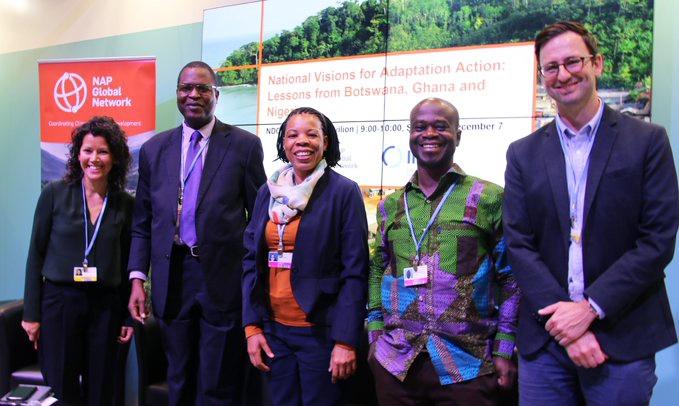
Adaptation experts from the governments of Ghana, Nigeria and Botswana shared their national visions for adaptation action a COP 25 side event organized by the NAP Global Network at the Nationally Determined Contribution (NDC) Partnership pavilion.
The event highlighted the three countries’ experiences with developing their NAP frameworks, focusing on how these documents have advanced adaptation planning processes and set the stage for effective adaptation planning and implementation.
Anne Hammill, director of the NAP Global Network Secretariat, opened the event explaining that many countries in the earlier stages of their processes are choosing to develop NAP frameworks—a strategic document that outlines the vision and structure for the NAP process, articulating why it is important and how it complements other elements of the climate and development policy suite in the country. Hammill said that NAP frameworks can act as a “statement of intent” for a country’s NAP process. The NAP Global Network has supported eight countries with developing NAP frameworks.
Dr. Antwi-Boasiako Amoah from Ghana’s Environmental Protection Agency explained that his country submitted a proposal for adaptation planning support from the Green Climate Fund in 2017. While waiting for the approval and for funds to be disbursed, Ghana worked with the NAP Global Network to develop a NAP framework (published in October 2018) to build momentum ahead of receiving GCF funding. Developing the NAP framework—followed by a strategy for engaging the private sector in national adaptation planning—helped to mobilize key stakeholders and kickstart the NAP process.
Janet Selato, from Botswana’s Department of Meteorological Services, shared her country’s experience with developing a NAP framework, which is nearing completion.
“Botswana is vulnerable to climate change, so the intention of the NAP process is to build a society that is resilient to climate change and also makes sure […] the vulnerability of the sectors is reduced to climate change impacts,” she said. Selato shared her country’s vision for their NAP, noting that it would be inclusive of diverse social groups, including the poor and youth, all the while being gender-responsive.
Nigeria, like Botswana, is also nearing the completion of a NAP framework. Dr. Peter Tarfa from Nigeria’s Department of Climate Change explained that certain parts of the country are highly vulnerable to conflict, thus impacting access to resources, reinforcing the necessity for adaptation solutions—part of which is addressed in Nigeria’s National Adaptation Strategy and Plan of Action.
“[Our vision is to] build resilience for all of the economic sectors of the country, so as to sustain the livelihoods of the Nigerian people from the impacts of climate change,” said Tarfa. “We also want to make sure it is very inclusive.” Tarfa also noted that Nigeria’s NAP process and NDC are “mutually complementary.”
In discussion following the panel, audience members shared perspectives and experiences on national adaptation planning, noting the importance of NAP support for Least Developed Countries (LDCs), highlighting approaches to engaging the private sector in NAP processes, and discussing opportunities for using NAP processes to inform the update and enhancement of adaptation information in NDCs in 2020.
Watch a video of the side event below
Learn more about our work in Botswana, Ghana and Nigeria.
What is the NAP process?
National adaptation planning is a strategic process that enables countries to identify and address their medium- and long-term priorities for adapting to climate change. The Paris Agreement has called on countries to engage in adaptation planning and implementation, and although not mandatory, many countries are choosing to include information on adaptation in their Nationally Determined Contribution—the signature vehicle of the Paris Agreement—in addition to their mitigation commitments. Read more.